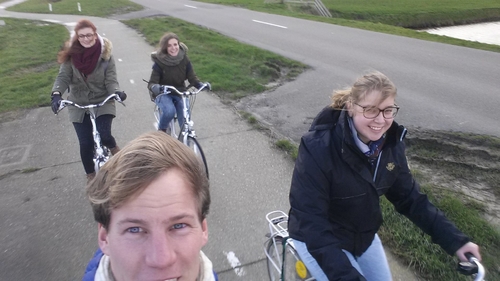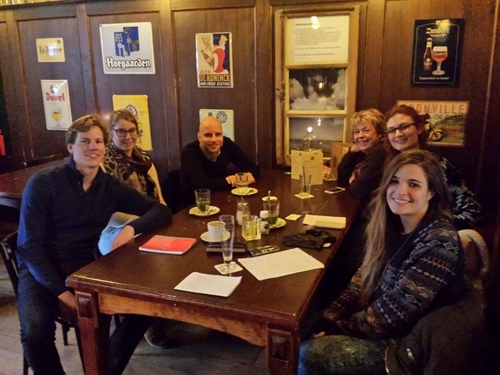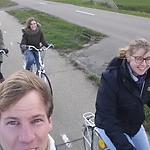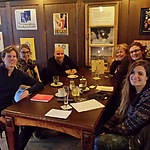The first part of our field research was an interview with Pepijn Lijklema, who is involved in a municipality’s project on improving education on Texel. Here we are biking to den Burg!
We met Pepijn and Vivianne at a café in den Burg, where we had a really productive discussion. After introducing ourselves, we shortly described the subject of our ESD research on Texel in general and also as a group of the Teach your own sub-system. We avoided presenting our own ideas for the sustainable Texel 2065 in the beginning of our discussion, as we wanted first to hear about their story. Our questions were divided into two main sections. First we wanted to know about their project on Texel, what do they do and why they do it, in what stage is their project, what problems they have encountered and what are their future plans. In the second part, some more general questions related to the key points of the general framework which we discussed this morning.
All in all there was flexibility in the flow of our discussion and both of the interviewees were really cooperative, willing to discuss and contribute to our gaining knowledge.
Their assignment from the municipality of Texel is to combine businesses with the higher levels of education (MBO, HBO) on Texel. The problem they are trying to address is the decrease in the young population of the island; companies of Texel also identify that there is a lack of young, properly skilled people to work for them. The creation of an intermediate (person or organization) between businesses and young students or graduates that will bring them in contact and arranging internships, as well as introducing business models/innovative and entrepreneurship oriented courses in all levels of education are some other plans that they work on. In the context of this project, Ms Vivianne Neeteson Lemkes is trying on educating/training teachers of the high school of Texel on how to use new technological means as distance learning tools, so that students are able to follow courses that it wouldn’t be able to attend otherwise. A minimum of 15 students is necessary to start a new course in a school and in den Burg’s high school the number of students is really small.
The conclusions of the interview are:
- The future is on tourism. It is the island’s asset while 80% of the economy is depended on it (15% is agriculture and fishery, 5% is other sectors)
- We have to find the expert product of Texel! The example of Samso is representative: They have become experts in sustainable transitions and energy saving and they sell this knowledge to the rest of the world)
- Money and funding are one of the main problems in the realization of the plans.
- Introvert behavior/island culture – negative attitude of the high school may be because of their monopoly
- “I can do it by myself” attitude: School in den Burg negative on having an external trainer on ITC’s and new technological methods of education because they think that they can do it evenly well by themselves
- Companies acknowledge that young people are missing from the island but they are not willing to invest by funding Pepijn’s project – not long term investors à island culture
- Mindset of people on Texel is really different from the mainland: lower competiveness than the mainland, slower rhythm; “you do what you like because you want it and not because someone else is also doing it”
What can be beneficial for our sub - system:
- An expert product of Texel could be the knowledge in particular subjects. There are already innovative projects happening on the island (generator…, fishery, lighting projects etc.).
- Promote the special way of living that Texel as an island already provides (quality of life, rhythm etc.)
- Creating competiveness by having more educational institutions on Texel could lead to change of attitude of the high school board.
- Freedom of choice in the decision of the youngsters in the future: where they want to study, and how they want to study
Here we are with Pepijn and Vivianne in den Burg.



